As the nation continues to reel from the COVID-19 pandemic, a silver lining could be that the art of storytelling may be making a comeback.
EDITOR’S NOTE: Veteran RACmonitor and ICD10monitor Copy Editor and Correspondent Mark Spivey has spent the last seven weeks with his wife at their home in Monmouth County, New Jersey, working remotely amid a long hiatus from public life. What follows is a column reflecting his opinions and his alone.
Those of you who stuck with HBO’s Game of Thrones to the bitter end will probably remember Tyrion Lannister’s brief speech well – the one in which he suggested that “there’s nothing in the world more powerful than a good story” in naming renowned storyteller Brandon Stark as a reasonably good option to lead the people of Westeros, following the flambé-ing of its royal capital by an ornery dragon.
It was widely recalled for less-than-ideal reasons, especially if you were a writer or producer on the 58-time Emmy award-winning show, as it and just about everything else about the eighth and final season were thoroughly and mercilessly lambasted by critics.
But I couldn’t help but think back to that line a few days ago, when RACmonitor/ICD10monitor Publisher and Monitor Mondays/Talk Ten Tuesdays Host Chuck Buck called me up to outline what I immediately thought was a great idea.
For weeks now, I and a litany of colleagues have been writing and editing numerous articles about what the COVID-19 pandemic has meant for the nation’s healthcare industry – the rapid-fire changes to coding and regulatory guidance, the dwindling of vital resources, and, most poignantly, the experiences of those front-line workers who are the only things standing between the public and oblivion.
I imagine that Chuck’s idea presented as a simple question: OK, so whose stories aren’t being told yet?
It’s how and why yesterday (Friday, May 1) we published essays penned by four teenagers: Aspen Albright, daughter of former Centers for Medicare & Medicaid Services (CMS) official and current Monitor Mondays permanent panelist Matthew Albright; Madison Allen, daughter of longtime RACmonitor contributor Knicole Emanuel, Esq.; Zachary Glaser, son of healthcare attorney and longtime RACmonitor/Monitor Mondays contributor David Glaser; and Buck’s own granddaughter, Trinity Buck.
Being tasked with reviewing and editing the essays, I had no clue whatsoever what to expect. In a nearly 20-year career, I’ve written nearly a thousand press releases and several thousand news articles and columns, as well as edited several more thousand pieces written by others, but throughout all of that, I’ve had seldom few interactions with younger generations.
Any trepidation I had vanished instantly. Not only could all four of these teens clearly write very well – maybe even a bit better than some of the adults with multiple advanced degrees and an alphabet soup of credentialing acronyms listed after their names, whose articles I edit, truth be told – but they were candid, introspective, and often, very, very funny. I encourage anyone reading this to also check out their work, available here:
Coronavirus: The Video Game By Aspen Albright
How Coronavirus has Affected Me as a Teenage Girl By Madison Allen
COVID-19: Staying at Home Spurs Renewed Hobbies By Trinity Buck
COVID-19: We’ll Get Through This—With Aplomb By Zachary Glaser
What’s more, it was satisfyingly refreshing to gain a new perspective on what this pandemic has meant to young people. It called to mind the sage words of one of my favorite writers, the late, great film critic, Roger Ebert, who once wrote that he viewed movies as “empathy machines” – the best ones effectively put you in the shoes of someone very different from yourself, thus allowing you to walk around in them for a while.
To me, writing is no different. Best Original and Adapted Screenplay have always been my favorite Oscar categories. And editing these essays, it occurred to me that everyone, everywhere, has their own set of individual stories about this collective experience, and they’re accumulating more every day. What’s more, these particular stories were geographically diverse, too: Aspen, Madison, Zachary, and Trinity penned their essays from laptops in Maryland, North Carolina, Minnesota, and California, respectively.
As for me, I write this from my kitchen table in the Cliffwood section of Aberdeen, New Jersey, the northwest corner of a region known locally as the Bayshore. It’s a string of blue-collar towns lining the south shore of Raritan Bay, where Bruce Springsteen and Bon Jovi are revered as gods and you’ll never have a hard time finding a good slice of pizza or PEC (pork roll, egg and cheese) sandwich, served on a hard roll with salt-pepper-ketchup, said as quickly as possible while ordering.
An easier way to describe it, for outsiders, would be that if you leave my development and turn right, in about five minutes you’ll be in neighboring Keyport, where on a clear day, from the picturesque harbor, you’ll see a breathtaking view of Manhattan’s skyline, far in the distance.
That’s my own personal COVID-19 story: I’ve spent it on the outskirts of the worst hot zone in the world. Without even really realizing I was doing it, at least at first, I’ve kept count of how many people I know personally who have received a positive diagnosis; as of right now, the number stands at 24. My only surviving grandparent, in her late 80s and in assisted living, acquired and handily beat it, thank goodness. An acquaintance from the city I used to cover as a newspaper reporter wasn’t as fortunate.
Despite the entire region being thrown into upheaval, my existence has somehow simultaneously grown more routine and mundane. I set my schedule by Governor Phil Murphy’s daily press briefings, during which the numbers of the Garden State’s newly diagnosed cases and deaths are announced (today it was 2,651 and 311, respectively, bringing our statewide totals to 121,190 and 7,538). I walk the dog at the same time every evening, 6:30 p.m., masked in one of the two dozen makeshift face coverings my wife crafted out of old T-shirts. The highlight of my week, every week, is driving 20 minutes down Route 34 to the best damn family-owned grocery market in the world, Delicious Orchards in Colts Neck, which offers contactless payment for prepackaged drive-thru grocery orders – gloved and masked workers load the bags right into your trunk, and they stick the card scanner through your cracked car window on a long wooden pole (if you’ve never tried their apple cider donuts, you haven’t really lived). Every last item that enters the house, whether mail, a bag of apples, or a bottle of wine, gets a Lysol wipe first – I have a minor underlying health condition, so I am exceedingly cautious, even by the standards you tend to see around here.
I try to find silver linings to all of this everywhere. I’m eating more fruits and vegetables than I ever used to, for one thing, as the Delicious Orchards bags are always packed to the gills with fresh produce. I’ve reconnected with so many old friends I’d fallen out of touch with, in part thanks to a daily morning routine in which I post a photo or photos from my senior high-school yearbook on social media, something that never fails to stir up conversation and laughs (today was Day No. 33 of that). I’ve brushed up on what’s by far my oddest claim to fame – being able to identify the flag of every nation in the world. I’ve even gotten a bit of work done on a novel, my first – a notion that once terrified me, but now just seems overdue.
I’d love to believe that I’ll wake up one morning real soon and there will be a coordinated federal serological antibody testing program in place. Or that the resources will become available for comprehensive contact tracing, nationwide. Or that a safe, effective treatment and vaccine will suddenly emerge, quashing the notion of an autumn resurgence. But I’m slowly coming to terms with the notion that this won’t just be a few weeks of working remotely or a couple of months of social distancing. Decades from now, I think we’ll remember the pandemic in the context of years. And I can’t even begin to guess how many.
But at least we’ll all have a few interesting stories to tell.























